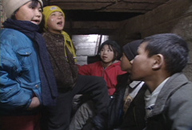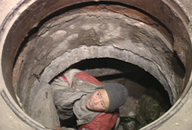
Song Sung by Manhole Children in 1998
We’ve lived in holes since we were small
And grew up lost in darkness
No light shone in our family homes
Tell me, Mother, why did you bring me into this world?
Everyday we’re hungry—there’s never any food
There’s nothing we can do but sing

In early 1990, with the fall of the Soviet Union, Mongolia was forced to make the transition from a communist to capitalist economy. The rapid introduction of a free market economy, however, produced massive economic confusion that caused massive unemployment and plunged nearly half of the population into poverty.
In the winter of 1998, while economic disorder was still at its height, thousands of children were living in manholes in the streets of Ulan Bator. The manholes provide access to a vast network of steam pipes that provide homes with heat. The children survived the bitter cold Mongolian winter by using these pipes as a heat source.
Young children not yet ten years old were living in a lawless no man’s land of theft and violence. Abused by their parents and separated from their families, they suffered great psychological trauma. In the process of documenting their plight, the film crew met three youngsters among others: Dashaa (14), the leader of a group of boys; Boldoo (13), a member of that group; and Oyun (14), the leader of a group of girls.
Dashaa was placed in a foster home at age ten when his parents divorced, but was forced to flee his violently abusive foster father and took refuge in the manholes. Boldoo’s parents also divorced, and he was sent to Ulan Bator by his mother to find work to help support the family. But when he arrived, he quickly discovered that there was no work for children to do. Oyun had grown up with her family, who all lived in manholes.
This documentary follows the lives of these three people as they grow into young adults over the course of a decade, laying bare the complex webs of dreams, friendships, betrayals, jealousies, violence, and love that shape their lives. The film for theatrical release is based on a television program broadcast by NHK of Japan, with additional footage culled from over 500 hours of shooting.